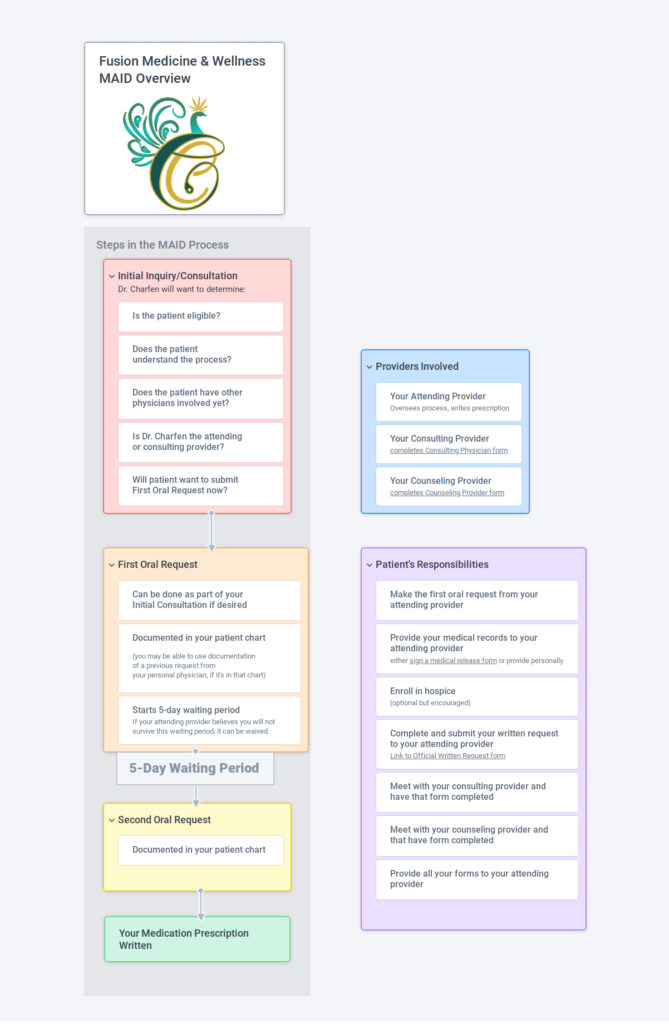MAID
A legal end-of-life option in Hawai’i

The Our Care Our Choice Act (OCOCA) is the Hawai’i state law that went into effect on January 1, 2019, and which legalized the practice of Medical Aid In Dying (MAID). The law was amended on June 1, 2023, to expand access to MAID for Hawai’ian citizens. This is a voluntary process through which a terminally ill, competent adult, who has a prognosis of six months or less to live and who is a resident of Hawai’i, may request medication from a physician, which they must be able to administer themselves to hasten their death.
Dr. Charfen was the first and only prescribing physician on any neighboring island for the entire first year this law was in effect. She has seen firsthand the confusion, distress and difficulties involved in accessing this end-of-life option. She vowed to her patients, who had experienced abandonment by their own physicians and health care systems in the last chapter of their lives, that she would do her best to lessen the struggles many dying patients still face, even when simply inquiring about this law. She often speaks and educates lawmakers, physicians and the community in having thoughtful, respectful dialogue about this law and about our mortality.
It can often be confusing and overwhelming when one is thinking about this process, and is trying to navigate all the legalities which our state requires. Below, you will find resources to help explain the process, as well as frequently asked questions which Dr. Charfen has encountered from patients, families, caregivers and physicians who are interested in understanding or pursuing this end-of-life option.
Resources
The Hawai’i Department of Health Website has a thorough review of the law and all its logistics. It is also the source to download state documents which you and your chosen physician will need, including the written request and final attestation form. You can also review the text of HB650, which amended the law on June 1, 2023, shortening the waiting period to 5 days and allowing additional types of providers to support patients in the process.
Compassion & Choices is the oldest and most active national nonprofit organization involved in improving care, expanding options and empowering everyone to chart their end-of-life journey. They have a library of resources, not only on Medical Aid in Dying, but many other end-of-life options and supportive tools.
Dr. Charfen is the co-founder of a nonprofit organization called Life & Death Wellness, whose goal is to support and educate around matters throughout all of life, but especially at the end. Please visit the site to watch her educational presentation on the OCOCA act in particular, or click here. You can also read more about her experiences on her website’s media and blog pages.
Another resource for patients, loved ones, and health care providers comes from a group called American Clinicians Academy on Medical Aid in Dying. They provide educational information and videos about the process, preparing the medication, and finding supportive physicians and end-of-life doulas in your area.
DISCLAIMER: Dr. Charfen provides web resources and links to organizations “as is” without any warranty of any kind. Provision of these web resources and links do not imply approval of the listed websites, warrant the accuracy of any information contained in those websites, constitute endorsement of the entities and its contents to whose sites the links are made, or endorse any of the opinions expressed on any of these external websites. These websites operate under the auspices and at the direction of their respective owners. If you have a question or comments about any of these sites, please contact them directly from their websites.
Who qualifies?
A patient must be:
- A Hawai`i resident, age 18 or older
- Diagnosed with a terminal illness, with a prognosis of six (6) months or less to live
- Mentally capable of making an informed decision
- Physically able to take the prescribed medication
Who doesn't qualify?
A person does NOT qualify if:
- they are not able to make their own medical decisions (e.g. end-stage dementia)
- they have progressive disease but is not yet considered terminal (i.e. less than six months to live)
- they are unable to take the medication voluntarily on their own, either by swallowing or by pushing a syringe into a feeding or rectal tube to administer the medication
- they are not a resident of the state of Hawai’i
If you are unsure if you or a loved one meets these criteria, please reach out to a knowledgeable physician who has educated themselves about the law and using this option.
Overview of the Process
Below is an overview of the steps in the MAID process in Hawai’i. You can click here to download a copy of this as a PDF document.

Details of the Process
Starting the process and the 5-day waiting period
- The qualified patient must make their first oral request to a physician or Qualified Advanced Practice Registered Nurse and have this documented in their medical chart.
- This request can be to any of the providers who are caring for you currently. Even if that provider refuses to participate, they are legally obligated to document the request in the record, so do not hesitate to ask this of them. Have this medical record sent to the provider who will take over the process.
- Physicians or Qualified Advanced Practice Registered Nurse can take this request.
- If you elect to use Dr. Charfen for this process, you can give your first oral request to her. Once this is done, the clock is started and the 5-day waiting period begins.
Providers needed
- A total of 3 providers must be involved.
- Two must be physicians, either MDs or DOs, or Qualified Advanced Practice Registered Nurses. (Physician Assistants and Naturopaths do NOT qualify.)
- The provider who oversees and is responsible for this entire process is called the Attending Provider. This will ultimately be the provider who can legally write the prescription once all steps are completed.
- The second role is called the Consulting Provider. This provider must agree with the diagnosis and prognosis, and that the patient has the mental capacity to make such a request. They must complete the simple Hawai’i state Consulting Physician form. A good source would be your primary care provider or specialty provider. Many times they may be willing to take on the Consulting Physician role even if they are not ready to do the Attending role.
- And finally, there is the Counseling Provider (either a psychiatrist, psychologist, licensed clinical social worker or licensed marriage & family therapist) whose role is only to state that the person requesting the medication is mentally competent to make the request, and does not appear to be suffering from untreated severe depression or other conditions which may interfere with the patient’s ability to make an informed decision. Either a psychiatrist, psychologist, licensed clinical social worker or licensed marriage & family therapist must be the person who completes the Counseling Provider Form.
- All providers must be licensed in the state of Hawai’i.
Finishing the process
- Complete the written request form, with two witness signatures (of which only one can be a relative) and return it to your attending provider as soon as possible.
- Schedule your second follow-up appointment with whomever is your attending provider, on or after day 5 from your first documented verbal request. Give your second oral request to that attending provider.
Once at least 5 days have passed, and the second request has been made, your attending provider is then legally able to write you the prescription for the medication, as long as all other criteria and evaluations have occurred.
The patient can stop this process at any point and is never under any obligation to fill the medication prescription once it has been written, or take it once it is dispensed.
Does a physician have to participate?
Just as the process is voluntary for the patient, it is also voluntary for the physician. Many physicians have chosen not to participate for various reasons, including their lack of knowledge or training, ethical or religious objections, or the healthcare system for which they practice forbids their participation.
It is always wise to ask your doctor if they would support your decision and help you get through the process. It is often the patients that teach the doctors how this law works and its importance as an end-of-life option.
Dr. Charfen is happy to speak to your primary or specialty care physician if needed to help mentor them if they have never done this before but are willing to participate.
Dr. Charfen is willing to perform either role if your own physicians refuse to participate. She also does her best to connect patients to willing physicians in their area on the Big Island.
Does a patient have to be enrolled in hospice?
Enrolling in hospice care if you are seeking MAID is optional, although it is encouraged by the state and by Dr. Charfen. Not only are you receiving another level of care from a compassionate team of providers who specialize in end-of-life care, there are other benefits. If you qualify for hospice, it makes it easier to qualify for MAID from a logistical standpoint, although it is not guaranteed. Also, if you decide to use your medication and are on hospice care, the police do not have to be called into your home at your time of death. And if you decide that hospice care is not for you after you have been enrolled, you can always stop the service.
What are the costs?
The cost of the process will vary depending on the consultant’s ability to use your insurance, charge a fee, or offer to do this pro bono. The medication costs will vary according to the compounding pharmacy chosen.
Dr. Charfen’s tips and practice fees:
- Dr. Charfen is able to accept some insurances, at this time such as Medicare and HMSA, which can cover parts of the process but not always all of them.
- If you are financially limited or indigent, please speak to Dr. Charfen about your situation. She does offer a sliding scale fee for those who qualify and does her best to assist patients regardless of their financial situations.
- If you have a primary or specialty physician who is open to being the attending or consulting physician, they can often classify part of this process as advance care planning. Your insurance may cover this option, so it is always wise to ask their position.
If you do not have accepted insurance:
- The fee for Dr. Charfen’s initial consultation as the Attending Physician who oversees the entire process, including taking the first oral request, evaluating the patient, and reviewing medical records, is $350.
- The fee to provide the second Attending provider consultation, which occurs on or after the 5-day waiting period, and includes obtaining the second oral request, evaluating the patient, completing all the DOH paperwork and writing the prescription, is also $350.
- She makes house calls for an additional fee, which will depend on the patient’s physical location.
- Dr. Charfen offers all her patients her presence at their bedside if she is available when they choose to ingest the medication. She is also willing to mix the medication for the patient and their family if so desired. If you are interested in this offering, please inquire with her, as this is not covered by any medical insurance.
- Dr. Charfen’s fee to be the Consulting Physician is $250, which will include reviewing the appropriate medical records to confirm prognosis, evaluating the patient physically or via telemedicine, completing the Consulting Physician form, and returning it to the Attending Provider.
Mental Health Provider fees:
- These will vary based on the provider.
- Some providers have offered to do this pro bono, accepted insurance and also charged fees.
- Dr. Charfen will provide you with a list of mental health providers who are open to working with Medical Aid in Dying patients if requested.
Medication Costs:
- Typically, the fees range between $400 to $600 for the medication, depending on the pharmacy that is chosen to fill the prescription.
- The medication must come from a compounding pharmacy, and currently there are none on the Big Island that are willing to provide the service.
- Dr. Charfen recommends using ElixRx in Kailua on Oahu, which charged $450 when last we checked. However, it is always your choice.
Required state forms
All forms can be found on the Hawai’i Department of Health website, but they are also linked here for your convenience:
Patient Required Forms:
- Patient Written Request Form can be completed anytime after the first oral request has been made. It is wise to do it as soon as possible and return it to your attending physician. There is a mandatory 48-hour waiting period before prescribing by law once this is received, so the sooner this is done, the better.
- Final Attestation Form is only required if you decide to take the medication. Do not fill this out until 48 hours before the chosen date of ingestion. This form protects your loved ones and your physician should someone call your decision into question.
Attending Physician Forms:
- Attending Physician Reporting Form should be completed by the attending within 30 days of writing the prescription and mailed into the state.
- Attending Physician Follow Up Form only gets completed after a qualified patient dies even if they did not ingest the medication.
Consulting Physician Form:
- Consulting Physician Confirmation and Verification Form is required to be sent to your attending physician from your consulting physician after your evaluation. It is a very simple 2 page form. Many physicians who may not be comfortable taking on the attending role, find the consulting role and the paperwork less responsibility.
Counseling Provider Form:
- Counseling Provider Statement of Determination Form is required to be sent to your attending physician from your counseling provider after your evaluation. We are the only state in the US with a MAID law that requires this extra step. Luckily, this is also a simple form and many providers will do this part over the phone or via video.
The Medication
Coming Soon

